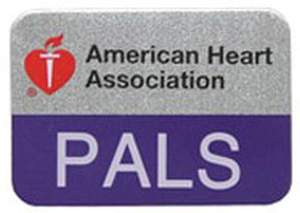

MedFriendly®


Pediatric Advaanced Life Support (PALS)
Pediatric Advanced Life Support (PALS) is a two-day
training program put forth by the American Heart
Association designed to teach pediatric health care
providers the knowledge and skills that are needed to
properly manage (e.g., while stabilizing and
transporting) critically ill children (including infants) and
those in emergency medical situations so they have
better outcomes (e.g., live longer). There is an
additional self-study day for the PALS course. The
PALS course is offered online.
FEATURED BOOK: Pediatric Advanced Life Support Provider Manual
Proper management skills taught in the PALS course includes a methodical approach to
assessment and treatment of children, basic life support, management of breathing (e.g.
respiratory distress and failure), management of shock, management of abnormal heart
rhythms, rapid intravenous administration of fluid or medication, and accessing the bone
marrow for injections (a type of tissue inside of the bones). Pharmacology is reviewed,
which is the study of drug action. Teaching a team approach to resuscitation is another
goal.
The course also teaches prevention and treatment of circulatory arrest, which is when
the blood stops circulating and the heart stops contracting. This includes teaching
synchronized cardioversion which is the application of a low energy shock to the heart to
establish a normal heart rhythm.
"Where Medical Information is Easy to Understand"™
Defibrillation (unsynchronized cardioversion) is the application of a
high electrical shock to the heart to establish a normal rhythm.
Circulatory arrest is also managed through early recognition and
management of respiratory distress, respiratory failure, and shock
that can lead to the heart stopping from decreased oxygen,
ischemia (insufficient blood flow), and acidosis.
Acidosis is a general term for a serious condition in which there is
an increase in acid or a decrease in alkaline substances in the
blood or tissues. Alkaline substances are the opposite of acids,
meaning that they are not acidic.
PALS training courses use simulated pediatric emergencies for teaching purposes. Those who will benefit
most from PALS training courses include emergency responders (e,g,, paramedics), Emergency Room
staff, and staff on intensive care units (particularly neonatal intensive care units) and critical care units.
Such staff commonly includes physicians and nurses. When the PALS course is completed, a completion
card is issued for verification, which can be used to fulfill job requirements. The card is valid for two years
and can be renewed by taking the course one month before it expires. If it expires without renewal, the full
PALS course must be taken again. The PALS guidelines were last updated in 2010. For more advanced
life suppport training, see the entry on Advanced Cardiac Life Support (ACLS).















